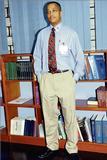
Neurosurgeon and chief resident at the University Hospital of the West Indies, Dr. Roger Eyon Hunter.
Avia Ustanny, Outlook Writer
NEUROSURGEON AND chief resident at the University Hospital of the West Indies, Dr. Roger Eyon Hunter was a recent recipient of the prestigious Braakman Diploma and prize by the European Association of Neurosurgical Societies (EANS).
Head of the Department of Neurosurgery at the University Hospital, Dr. Ivor Crandon, told Outlook, "This is a unique achievement for both Dr. Hunter and the University of the West Indies."
The resident training programme of the University of the West Indies has produced four previous graduates in neurosurgery. In 2006, two others, including Dr. Hunter, will join their ranks. Hunter is the first Caribbean citizen to have snagged the Braakman prize.
Roger Hunter, the last child of four children for civil servants Monica and Jepthah Hunter, is the third to have collected a PhD.
Brother, David Hunter, is a surgeon at Cornwall Regional Hospital in St. James. Brother Andrew Hunter who lives in New Jersey, U.S.A, possesses a PhD in engineering. Sister Andrea hunter is a dental nurse and certified accountant. As a child, Roger attended New Day All-Age School in Kingston and then Jamaica College. He recalls, "I was always fascinated by the brain. It is the only organ which cannot be transplanted. It is the centre of the mind."
After Jamaica College, he enrolled at the University of the West Indies, choosing medicine and then neuro-surgery as his speciality.
It it were not for his love of the brain, he said, perhaps he would have chosen internal medicine instead of neurosurgery. With this specialisation he gets to "cut it (the brain) open, see it, operate on it and see patients in recovery. There is nothing more gratifying than this," he adds.
" I remember one man who was sent home to die. We operated on him and today he is walking around healthy."
Hunter's journey to full qualifications has been a long one.
He graduated from The University of the West Indies in 1996 with the Bachelor of Medicine, Bachelor of Surgery (MBBS) degree with honours.
ACADEMIC ACHIEVEMENTS
He obtained subject honours in anatomy, physiology, biochemistry, pathology, microbiology obstetrics and gynaecology and medicine. He was also recipient of the David Gunberg Prize in Anatomy, the Glaxo-Welcome Clinical Medicine Award and the Allenbury Award in Medicine.
Roger performed very well and was awarded the final fellowship in neurosurgery in the United Kingdom in 2004. He previously sat the primary examination (part one) of the European Association of Neurosurgical Societies (EANS) in Uppsala Sweden in February 2005 and was top in the U.K. and second overall. In March 2006, he received the award for being the best candidate at the oral part two examination of the EANS examination in neurosurgery.
Hunter tied with Martin Schumman of Leipzig, Germany, who, along with him, was subjected to a third round of orals in order to determine who would come out on top.
The Braakman prize is named after a Dutch neurosurgeon who sought to harmonise neurosurgical training throughout Europe.
The European examination in neurosurgery consists of two parts: the primary examination and the oral examination. The primary examination is a written examination covering neurosurgery, neuroanatomy, neuropathophysiology, neurology, neuroradiology, fundamental clinical skills and other disciplines.
The oral examination is the second and final of the European examinations. The examination is a clinical problem-solving and patient management test involving the use of case histories. The part two exam is set to the level of a consultant two years out of residency training. Candidates are required to explain how they would proceed to evaluate or manage the cases to plan and perform the proposed operations, if necessary.
BEST CANDIDATE
The best candidate in the oral examination is awarded the Braakman Diploma/Prize. With this award, Dr. Hunter admits that he could, in the near future choose to work in any country in the world and perhaps any institution, but he is interested only in Jamaica.
Dr. Ivor Crandon comments: "Dr. Hunter is an intelligent and bright young man. I have great hope for him being a great neurosurgeon and becoming a contributor to the University of the West Indies."
As a neurosurgeon, Dr. Hunter treats such conditions as brain aneurysms which can lead to massive haemorrhages, brain tumours, cancers of the brain and spinal tumours.
Treatment locally also includes gunshot cases which leaves injury to the brain and the spine. Surgery can last for between three to 10 hours, but with changing technology the time spent in doing procedures is being reduced.
COME A LONG WAY
Roger Hunter has come a long way from dissecting lizards a favourite pastime as a child. He is committed today to making a contribution in the area of neurosurgery and teaching Caribbean students.
A member of the Jamaica Medical Doctors Association, Dr. Hunter also belongs to the Society of British Neurological Surgeons and the European Association of Neurosurgical Societies.
Married to paediatrician in training, Dr. Charmaine Hunter, Roger Hunter is father of seven-month-old William.
He says about his son, " I believe in him growing up in Jamaica and getting his Jamaican roots solidly grounded."
For himself, he insists, "I have a contribution to make. I am driven.
"Neurosurgery is at a turning point in Jamaica. Conditions which once had to be treated in New York can now be treated here. Even though we are lacking in some equipment, we are not lacking in skill."

